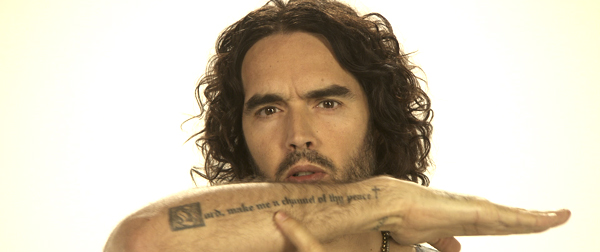In The Emperor’s New Clothes, comedian Russell Brand and filmmaker Michael Winterbottom join forces to explore the origins and impact of the financial crisis of 2007–2008 and the growing disparity in wealth distribution.
Polymath Brand is a flamboyant and controversial figure, equally as famous for his short-lived marriage to Katy Perry and overcoming drug addiction as he is for his comedy, acting, writing, and activism. He wears his politics on his sleeve in this film; its release was timed to coincide with the British election in May 2015.
The film balances political and economic investigation, with a comic quest in the style of Michael Moore, to expose the irresponsible bankers and wealthy tax avoiders. Winterbottom combines Brand’s direct-to-the-camera appeals with archive footage, interviews with economists, former bankers, Occupy Wall Street activists, and those vulnerable individuals living on the bread line.
Concentrating on the British economy, while drawing comparisons with the United States, Brand traces the origins of the crisis to Margaret Thatcher and Ronald Reagan. When they assumed power 35 years ago, their adoption of free market fundamentalism was a turning point. Brand advocates that this belief in the ability of laissez-faire or free market policies to solve most economic and social problems, as proposed by Milton Friedman of the Chicago School of Economics, led to the deregulation of the banks.
Brand begins in Grays, Essex, by looking at the decline of his suburban hometown, a satellite 20 miles east of London, since austerity was imposed after bank debts were absorbed by the state to contain the financial crisis. In intimate interviews, Brand champions the working poor who have lost their state benefits while corporations post huge profits and avoid taxes.
While the UK government repeats its mantra “We’re all in this together,” in reality the poorer in society have paid the price of the austerity cuts after the bank bailout while financial institutions continued to pay their CEOs vast salaries and staff huge bonuses. These serious issues are counterpointed with comedic set pieces. Brand drives through London’s financial center pleading through a megaphone for bystanders to give up bankers whose faces are printed on the side of his vehicle.
Brand questions government priorities and complicity and asks why bankers have not faced penalties for their reckless behavior. He goes on to compare the lack of any custodial sentences given to bankers with the lengthy prison terms given to UK youthful rioters for minor thefts during the looting that followed in 2011.
Brand rails against major employers, such as Tesco and Walmart, who do not pay a living wage so that their employees are reliant on state benefits to make ends meet while Amazon, Apple, and Starbucks are lambasted for their tax arrangements. He highlights government collusion in legal corporate and personal tax evasion via offshore accounts. Among those exposed for holding their family trusts offshore are British Prime Minister David Cameron and the UK Chancellor of the Exchequer George Osborne. He lobbies for a living wage to be imposed and offshore accounts to be taxed and the money returned to the country of origin.
Brand’s delivery is energetic. He’s charming in the personal interviews, playfully ignorant when it suits, and obviously liked by the public. Winterbottom’s film balances lighthearted moments with serious content to expose the economic deception that has become accepted. The Emperor’s New Clothes is a thought-provoking, accessible, and an entertaining call to action.







Leave A Comment